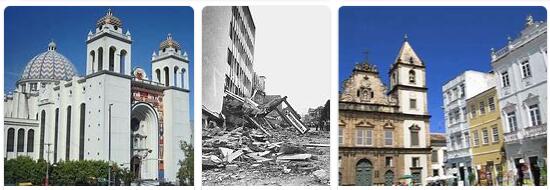Jamaica Overview
Surface: 10,991 sq km (land: 10,831 sq km water: 160 sq km)
Population: 2.9 million (July 2011, CIA). Blacks 91.2%, mixed ancestors 6.2%, other or unknown 2.6%.
Population density: 261 residents per square kilometer
Population growth: 0.733% per year (2011, CIA)
Capital: Kingston (585,300 residents, 2006)
Highest point: Blue Mountain Peak, 2,256 m
Lowest point: Caribbean, 0 m
Form of government: According to constructmaterials, Jamaica has been a parliamentary monarchy since 1962, represented in the Commonwealth. The constitution dates from the same year. The bicameral parliament consists of a House of Representatives with 60 and a Senate with 21 members. Jamaica has been independent from Great Britain since August 6, 1962.
Administrative division: 14 parishes: Clarendon, Hanover, Kingston,Manchester, Portland, Saint Andrew, Saint Ann, Saint Catherine, Saint Elizabeth, Saint James, Saint Mary, Saint Thomas, Trelawny and Westmoreland
Head of Government: Prime Minister Portia Simpson Miller, since January 5, 2012
Head of State: British Queen Elizabeth II, represented by Governor General Patrick Allen since February 26, 2009
Language: The official language in Jamaica is English, the unofficial national language is Patois.
Religion: Protestants make up the majority with 62.5% (among them especially Adventists 10.8%, Pentecostal 9.5%, Other Church of God 8.3%, Baptists 7.2%, New Testament Church of God 6, 3%, Church of God in Jamaica 4.8%). 2.6% of the population are Catholic. Also Muslims, Jews, Hindus and Rastafarians.
Local time: CET – 6 h. In Jamaica there is no change between summer and winter time.
The time difference to Central Europe is -6 h in winter and -7 h in summer.
International phone code: + (876)
Internet ID:.jm
Mains voltage: 110V, 50 Hz, but many hotels use 220V / 50 Hz. US flat plugs are standard in Jamaica, adapters are required.
Best time to travel to Jamaica
Jamaica is a suitable travel destination all year round: winter is usually characterized by warm days and mild to cool nights, while the summer months are hot. Rain usually only falls for short periods of time (usually in the late afternoon), and it is entirely possible to enjoy sunshine during the rainy season. In the Portland area, however, it can rain for days.
The water temperatures in Jamaica are always pleasant, a beach holiday is possible here all year round.
The high tourist season is between mid-December and mid-April. Many hotels have high season rates over Christmas and Easter. However, this is less due to the climate of Jamaica than to the holidays and the bad weather in North America and Europe.
Health and Diseases in Jamaica
Vaccination protection
The Federal Foreign Office’s health service will provide vaccination protection against tetanus when traveling in Jamaica, hepatitis A and diphtheria recommended, for longer stays (more than 4 weeks) protection against hepatitis B, typhoid and rabies. When entering from a yellow fever area, all travelers who are older than 1 year are required to have a valid yellow fever vaccination.
Malaria
In the past Jamaica was considered malaria free. In 2006 and 2007, however, there were new introductions of malaria with smaller outbreaks in the region around the capital Kingston. Although these outbreaks have stopped, the vector mosquitoes are endemic to Jamaica, so there is a latent risk of renewed malaria outbreaks. A consistent mosquito repellent is strongly recommended, this limits the possibility of mosquito-borne people diseases(see also Dengue) a. Additional medical care is currently not considered necessary.
Dengue fever
In Jamaica, dengue fever also occurs in the severe hemorrhagic form. in the course of disease serious damage to health with fatal outcome is possible. Dengue is transmitted by diurnal mosquitoes, it is strongly recommended to wear clothing that covers the body all day long (long trousers, long shirts), sleep under a mosquito net and use insect repellent.
HIV / AIDS
Around 25,000 HIV / AIDS infections are reported in Jamaica each year. The risk of a life-threatening infection with HIV / AIDS always arises from heterosexual and homosexual contacts as well as drug use (for example unclean cannulas or syringes or cannulas) and blood transfusions. The use of condoms is always recommended, especially with casual acquaintances.
Diarrhea and cholera
Most diarrheal diseases are preventable with proper drinking water and food hygiene.
Some basic rules
Never drink tap water but, for example, bottled water. If bottled water is not available, filter and disinfect water or boil it off. Also use drinking water to brush your teeth or wash the dishes. Peel, boil or disinfect food. Make sure that no flies get to your food. Hands should be washed often with soap, always after a bowel movement, before preparing food and before eating. If it is appropriate, disinfect your hands as well, use disposable towels.
Medical supplies
Medical care in the country is not comparable to European conditions; this is particularly true for emergency care. Immediate cash payments are usually required from treating doctors and hospitals. It is therefore strongly recommended that you take out adequate travel health insurance with reliable repatriation insurance when traveling in Jamaica.
Before traveling to Jamaica, seek advice from a tropical / travel health professional.
In addition to my general disclaimer, please note the following important note:
A guarantee for the correctness and completeness of the medical information and liability for any damage that may occur cannot be assumed. You stay responsible for your healthy.






